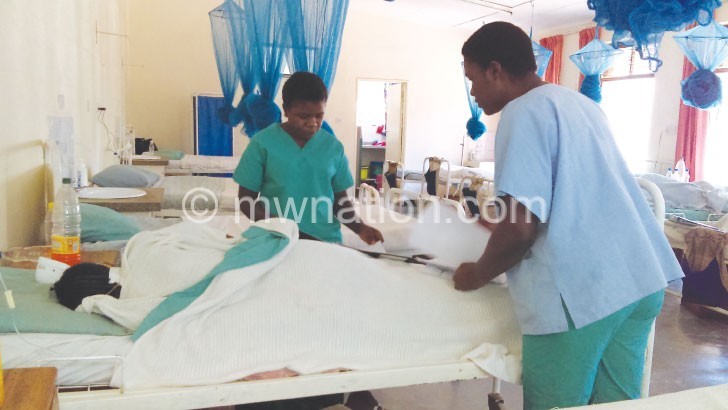Restoring women’s glory
Every day, Monica Mwale, 23, sets off for work to Bwaila Fistula Care Centre in Lilongwe.
The woman from Kadamwale Village in Kasungu is among survivors of obstetric fistula who produce 150-180 reusable sanitary pads a week to raise funds for treatment of patients of the degrading condition caused by birth complications.

She got pregnant at 18 and endured prolonged obstructed labour which left a hole in her pelvis. The sustained pressure of the baby’s head on her pelvic bone damaged the soft tissues, creating a hole—called fistula—between the birth canal and the urinary bladder. The result was continuous leaking of urine.
“It was a huge problem,” she says. “I couldn’t go to school or near my friends because I smelled. This affected my education.”
Mwale is now fistula-free and back to school.
In contrast, Irene Mazuko, 32, from Chisemphere in Kasungu is waiting for a surgery to repair the hole incurred while giving birth to a third child in 2009. She recalls spending four days in labour before doctors operated on her. The stillborn left her with obstetric fistula.
“They said the baby had damaged my insides. I went from one hospital to another, seeking help, but found none. Then I came to Bwaila Fistula Centre after hearing some women saying they were healed after the surgery,” she narrates.
Mazuko is among over 60 women undergoing fistula repair surgeries during a three-week camp supported by the United Nations Population Fund (UNFPA).
Over 2 000 clients have been repaired since the opening of Bwaila Fistula Centre in 2010.
UNFPA estimates that about 20 000 women in the country may be living with fistula, which exposes them to stigma and restricted economic opportunities.
Some women suffer the humiliation of being abandoned by their spouses.
Unfortunately, many cases go undetected due to skills and funding gaps in primary healthcare.
This is the main setback for Dr Rachel Pope, a surgeon at Bwaila.
She states: “For thousands of women with obstetric fistula, the key to a normal life is getting repairs. We need to spread the word. Women should know what obstetric fistula is and that it can be prevented and it can also be repaired.
“Women do not have to live with the stigma when they are leaking urine. They need not get infections from the fistula lasting a long time and they shouldn’t be having problems with their overall quality of life. The sooner they get surgery, the better.”
Apart from supporting fistula treatment, UNFPA works with government and non-government organisations to stop women and adolescent girls from getting fistula due to unintended pregnancies. This is part of a nationwide campaign to ensure people understand fistula, preventive measures and where they can get treatment in time.
“Most fistula patients come from the most vulnerable and marginalised groups, making it hard to claim their rights. Most of them do not know how to read and write, which makes them much weaker to get information, seek assistance and claim their rights,” says UNFPA country representative Young Hong.
The major concern is that most women and adolescent girls are still not aware of the dangers of early pregnancies, she reckons.
Yong dialed up calls for increased access to modern family planning methods and information as widespread poverty, cultural practices and social pressure keep pushing girls to marry and get pregnant when their bodies are not ready.
Fistula Care Centre country director Margaret Moyo advises pregnant women and health workers to avoid delays that may lead to obstetric fistula.
She says: “We have seen that most women come from places far from the hospital. A woman with obstructed labour needs Caesarean Section, which most health centres may not offer. Such mothers have to be referred to the nearest district hospital where C-section can be done. They have to call for an ambulance to pick up the patient, causing another delay.”
She attributed delays that occur within the hospital to shortage of skilled health workers and operating theatres, where women with obstructed labour sometimes wait longer for operations.





